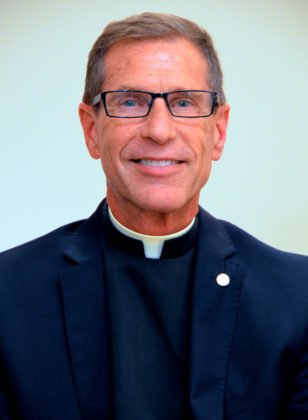“I naively thought I would bring the Word of God to the deaf community. They have shown me a God of patience, perseverance, trust, and deep faith in the face of life’s difficulties. I have received much more from them than I have given.”
-Fr. Guy Blair, SCJ
Fr. Guy Blair, SCJ, has spent many years ministering with the deaf and hearing impaired. In the April 13th issue of Dehonian Spirituality, he writes about the deaf community being the “aliens among us.” His text appears below. Click here to subscribe to Dehonian Spirituality, a weekly e-publication produced by the Dehonian Associates office.

The “alien” [illegal or not], often makes the headlines these days. Well before countries began setting up borders and deciding who was an insider or an outsider, there was and remains a group of persons — the deaf community — as aliens among us. They are alien to our spoken language. That alienation is reflected in the arduous journey of education, in employment, in society, and in interpersonal relationships.
Fr. Leo Dehon’s spirit was sensitive to the marginalized, to the alien. Our SCJ Community continues to live in his spirit, reflecting in our ministries the inclusivity and tenderness of God’s Heart. I have enjoyed working with the deaf community, although it has not been an easy journey — first to acquire fluency in sign language and then to enter a culture visually focused with social rules so different from the dominant hearing culture.
It is estimated that only 4% of the deaf community has an affiliation with any worshipping community. This statistic speaks to the marginalization the deaf face in faith communities even as the Gospel of the healing of the deaf man is proclaimed [Mark 7:31-37]. Communities often fail to notice the “deaf alien” among them or presume the story is metaphorical and applies to “deafness of the heart.” It isn’t the ill-will of the parishioner which contributes to the marginalization of the deaf person; it more often is decisions made at the diocesan level. Calculating the cost of the ministry for the small number of deaf doesn’t warrant the expense for many.
I have learned from the deaf community that “less is more” in the liturgy of the Mass. It isn’t only music, intrusive lighting, over-abundant floral and candle arrangements which detract from the central event of signing in the deaf liturgy. It is also our hearing culture’s love of repetition, long and “wordy” prayers, references to novels, movies, and literature. Rarely has any hearing parishioner informed me that my homily was too long; however the deaf register their level of interest and endurance by simply closing their eyes! To the hearing person this might seem impolite, but to the deaf person, who must see to participate, this warns me, “Father, make an end to it!”
Many years ago, a deaf priest [a rare person indeed] taught me a valuable insight about the WORD among us. Jesus Christ, the Word, was not born as a Bible in the manger, but as a child, a human being. It is all too easy for the hearing community to say ignorance of the Scriptures is ignorance of Christ. Until recently, the printed Word was a barrier for the deaf community. However, the Scriptures are now in a DVD format, signed in ASL [American Sign Language]. The miracles and teachings of Jesus are not simply signed in English as we would read them but INTERPRETED with deaf culture in mind with facial expressions, body language, and cultural references easily recognized by the deaf.
The actions of the person, of Jesus Christ, speak the message. In my life as a priest I have tried to allow my actions to “preach” the message — less talk, less homilizing — more action.
I naively thought I would bring the Word of God to the deaf community. They have shown me a God of patience, perseverance, trust, and deep faith in the face of life’s difficulties. I have received much more from them than I have given.

